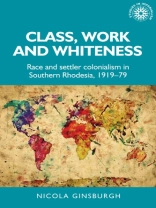This book offers the first comprehensive history of white workers from the end of the First World War to Zimbabwean independence in 1980. It reveals how white worker identity was constituted, examines the white labouring class as an ethnically and nationally heterogeneous formation comprised of both men and women, and emphasises the active participation of white workers in the ongoing and contested production of race. White wage labourers‘ experiences, both as exploited workers and as part of the privileged white minority, offer insight into how race and class co-produced one another and how boundaries fundamental to settler colonialism were regulated and policed. Based on original research conducted in Zimbabwe, South Africa and the UK, this book offers a unique theoretical synthesis of work on gender, whiteness studies, labour histories, settler colonialism, Marxism, emotions and the New African Economic History.
Inhaltsverzeichnis
Introduction
1 The making of white worker identity
2 The Great Depression and shifting boundaries of ‚white work‘
3 The Second World War
4 The ‚multiracial‘ Central African Federation, 1953–63
5 White fights, white flight and the Rhodesian Front, 1962–79
Conclusion
Selected bibliography
Index
Über den Autor
Nicola Ginsburgh is a Postdoctoral Fellow with the International Studies Group at the University of the Free State, South Africa












